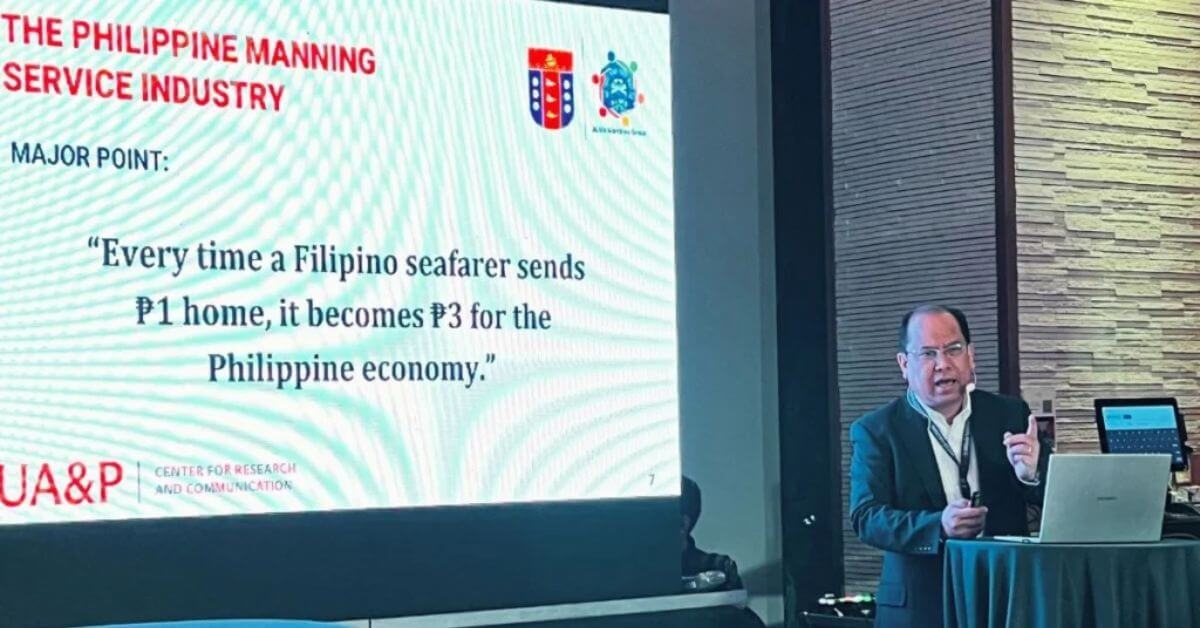
Large Queues Of Vessels Form At Port Of Antwerp-Bruges As National Strike Disrupts Traffic
November 26, 2025
4 Crew Members Injured After Engine Room Fire On Cargo Ship At Port Of Wilmington
November 27, 2025

A new study has found that Filipino seafarers and the country’s manning industry generated an estimated ₱1.06 trillion in economic impact in 2024, highlighting their critical role in supporting the national economy.
The study, the first of its kind, was conducted by the Center for Research and Communication (CRC) of the University of Asia and the Pacific (UA&P) in partnership with the Association of Licensed Manning Agencies (ALMA Maritime Group).
Researchers reported that the seafaring sector contributes around 4% of the Philippines’ Gross Domestic Product (GDP) and supports nearly 400,000 jobs across the country.
According to the findings, Filipino seafarers generated ₱150.1 billion in household income in 2024 and sent ₱331.7 billion in direct remittances, which circulated through various industries such as housing, food, education, transportation, and local services.
CRC President Dr. Winston Padojinog explained through indirect reporting that every peso sent home by a seafarer multiplies as it moves through different sectors, with nearly ₱3 rebounding in the economy due to industry multipliers.
Foreign shipowners’ continued preference for Filipino crew was cited as a major factor behind this economic strength. ALMA noted that entire communities benefit when shipowners hire Filipinos and spend money on pre-deployment needs such as training, medical services, hotels, and government fees.
The report highlighted that the industry supports an extensive domestic network of onshore jobs, from crewing and logistics to training centres, insurance providers, and service companies. This ecosystem, the study warned, depends heavily on maintaining global confidence in Filipino seafarers.
The study stated that confidence in the workforce must not be taken for granted. It cautioned that if shipowners were to lose trust, whether due to regulatory uncertainty, uneven enforcement, or global competition, the consequences would be immediate, as “ships leave when confidence breaks”. Such a loss, researchers added, would put ₱1.06 trillion in economic activity and thousands of jobs at risk.
ALMA said that safeguarding shipowners’ trust is essential at a time when other seafaring nations are competing aggressively for the same roles.

As part of efforts to strengthen the industry, the group proposed five urgent reforms:
- A “Blue Check” Manning Agency Programme, a government-accredited certification for ethical and compliant manning agencies.
- A Tiered Penalty and Enforcement Matrix to promote fair and consistent regulation.
- A Modernised Tax Administration, featuring no-contact audits, clear timelines, published rules, online LOA tracking, and an independent dispute review panel.
- An overhaul of Voluntary Arbitration at the National Conciliation and Mediation Board (NCMB), with stronger evidence standards, due process, and presidentially appointed arbitrators.
- Continued support for Magna Carta reforms to address EMSA compliance and prevent ambulance-chasing practices.
ALMA’s chairman, Atty. Iris Baguilat, was quoted indirectly saying that policy instability would weaken the country’s competitive advantage and reduce shipowners’ confidence in hiring Filipino seafarers.
Beyond its economic contribution, the study highlighted the social effect of the maritime industry. Researchers observed that every Filipino working at sea helps sustain a household on land, funding education, housing, and long-term stability for families.
The study also stressed the importance of programmes that help retiring seafarers transition into training, management, or regulatory roles. It added that years of technical experience accumulated at sea could further strengthen the country’s maritime sector if reintegrated effectively.
According to the CRC–ALMA study, supporting the seafaring industry is equivalent to safeguarding the livelihoods of Filipino families and sustaining a crucial 4% of the national economy.
The report stressed that protecting global confidence in Filipino workers will ensure long-term stability for one of the Philippines’ most vital economic drivers.
As the study concluded, Filipino seafarers are not only navigating ships across the world, they are also helping steer the Philippine economy forward.
Reference: CRC
Source: Maritime Shipping News


